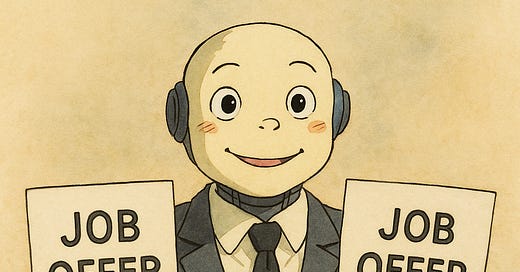Before we begin:
Don’t forget to follow me on instagram (same handle randomrecruiter) as I look to build that account out as well. There I focus on memes/reels that don’t make it to X.
I’m starting a new service. For paid subscribers on here who upgrade and pay for the year in full, you get a free resume and linkedin review (and save $10 vs subscribing monthly) for $50. When you upgrade, it will let me know, and I’ll reach out to you directly. You can also email me directly at randomrecruiter3@gmail.com with a screenshot/confirmation and will go from there.
In this issue:
Why leverage is the most important currency in any job negotiation
How today’s tech job market flipped to favor employers
The real reasons recruiters pull offers (and how to avoid it)
A behind-the-scenes look at how Jerry negotiated a $7/hr raise
The exact script to use when you have competing offers
Every negotiation boils down to one thing: leverage.
If you have it, you can afford to negotiate. If you don’t, you might want to think twice.
This is especially true in today’s tech job market. For the first time in 15 years, the pendulum has swung. This is an employer’s market. And if you’re not careful, pushing too hard in a negotiation can backfire.
Let’s break it down.
The Game Has Changed
It used to be that top engineers had their pick of the litter. Multiple offers. Recruiters blowing up their inbox. Signing bonuses just for showing up.
That world is gone.
Today, companies have options. Too many of them.
There’s a wave of talent on the market:
People laid off
Contractors whose extensions were denied
Folks on performance improvement plans
Passive candidates ticked off about a weak bonus, missed promotion, or forced RTO
In other words, supply is high. Demand is more selective. That means the negotiating table is tilted against you unless you come in with leverage.
And when you do negotiate, it has to be surgical.
Leverage Comes in Two Forms
Multiple offers. This is the most obvious form of leverage. If two companies want you, you can let them compete. You don’t even have to get aggressive. You can just ask, "Is this the best rate you can do?"
Pipeline momentum. Maybe you don’t have another offer yet, but you have interviews lined up. You’re not desperate. You have options. That alone gives you peace of mind—and confidence.
The worst time to negotiate hard is when you’re staring at one offer with no backup. Your leverage is gone. And if you come off as entitled, difficult, or high risk, you might lose the only offer you have.
What Recruiters Are Really Looking For
Most job seekers think recruiters only want someone who checks the technical boxes. That’s only half true.
Recruiters are under pressure to deliver candidates who:
Will accept the offer
Will show up on day one
Will stay long enough to make the hire worth it
You could be the most qualified candidate on paper, but if you seem like you might walk, ask for more money after accepting, or ghost them, you become a liability.
And in today’s market, no one wants to take on risk.
The Story of Jerry
Let me give you a real story.
We’ll call him Jerry.
Jerry is a Java/Python engineer based in New Jersey. He has 15+ years of experience building financial applications, mostly for large banks. He's smart. Reliable. No drama.
Keep reading with a 7-day free trial
Subscribe to Level Up Careers to keep reading this post and get 7 days of free access to the full post archives.




